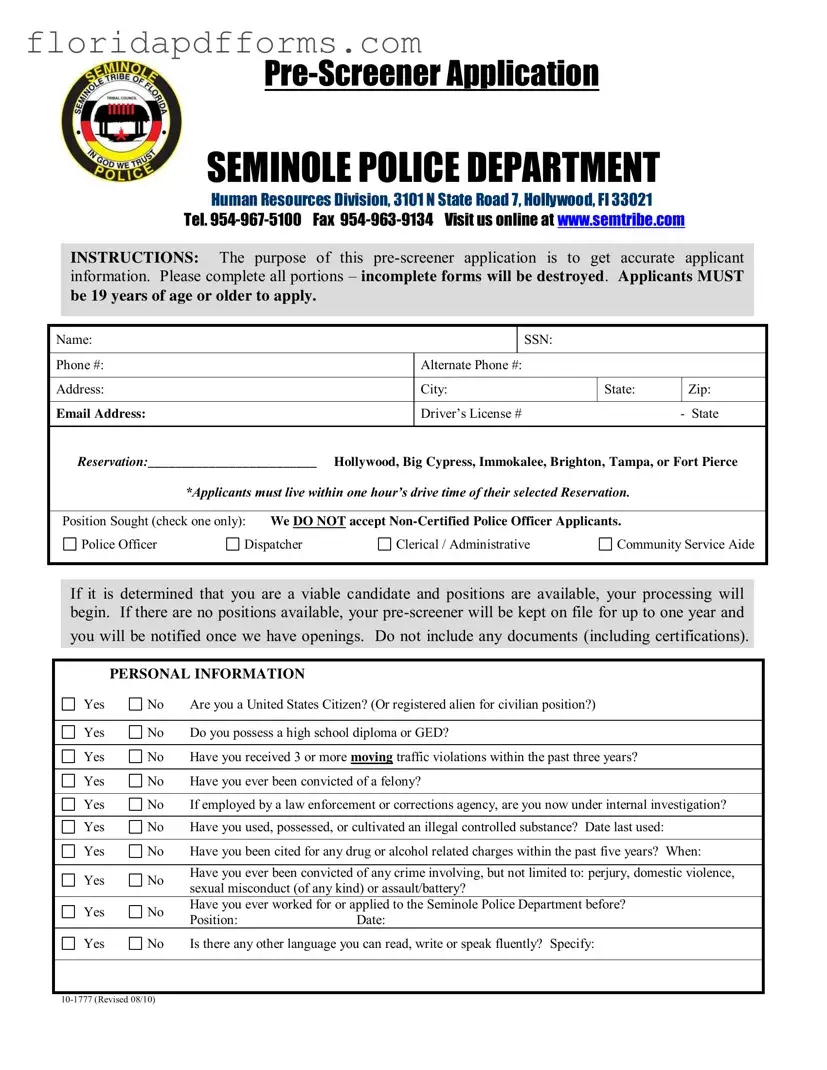The Florida 10 1777 form is similar to the Federal Form I-9, which is used for verifying the identity and employment authorization of individuals hired for employment in the United States. Both forms require personal information such as name, address, and Social Security number. They also include questions about citizenship status, ensuring that applicants meet eligibility requirements for employment. The I-9 form must be completed by both the employee and employer, whereas the Florida 10 1777 is focused solely on the applicant's information for police department positions.
Another comparable document is the Employment Application Form commonly used by various employers. This form collects personal information, employment history, and education details from applicants. Like the Florida 10 1777, it aims to gather comprehensive data to assess candidates for job openings. Both forms require applicants to disclose any criminal history, though the Florida 10 1777 emphasizes law enforcement-specific qualifications and background checks.
The Job Application for Law Enforcement Positions is also similar. This document is tailored for candidates seeking positions within police departments and includes sections for personal information, employment history, and criminal background. The Florida 10 1777 and this application both require disclosure of any previous law enforcement experience and any disciplinary actions taken by past employers, which is crucial for assessing suitability for law enforcement roles.
Additionally, the Background Investigation Release Form is akin to the Florida 10 1777. This form is used to authorize a background check on an applicant. Both documents serve to ensure that the applicant meets the standards required for law enforcement positions. The Florida 10 1777 gathers preliminary information, while the Background Investigation Release Form is focused on obtaining permission to conduct a more thorough review of the applicant's history.
The State of Florida’s Driver License Application shares similarities with the Florida 10 1777 form. Both documents require personal identification information and inquire about any legal issues, such as traffic violations or criminal history. The Florida 10 1777, however, is specifically designed for police department applicants, while the Driver License Application is used for obtaining a state-issued license.
The Military Service Record Request Form is another document that resembles the Florida 10 1777. This form collects information about an individual’s military service, including branch, rank, and discharge type. Both forms require applicants to provide details about their background, and the Florida 10 1777 incorporates military history as part of the overall assessment for law enforcement suitability.
The Application for Federal Employment (OF-612) is similar in that it is used for federal job applications. Both forms require detailed personal information, employment history, and education records. While the OF-612 is broader in scope, the Florida 10 1777 is focused specifically on law enforcement roles, requiring specific disclosures related to criminal history and law enforcement training.
The College or University Application Form also bears resemblance to the Florida 10 1777. Both forms collect personal information and educational background. They may include questions regarding criminal history, though the Florida 10 1777 places a greater emphasis on law enforcement qualifications and the applicant's fitness for police work.
The Criminal History Record Check Form is another document that parallels the Florida 10 1777. This form is specifically used to request a review of an individual’s criminal history. Both documents require the applicant to disclose any past criminal activity. However, the Florida 10 1777 is more comprehensive, integrating employment history and personal information alongside criminal history inquiries.
Lastly, the Personal History Statement used by various law enforcement agencies is similar to the Florida 10 1777. This document is designed to collect a wide range of personal information, including employment history, education, and criminal background. Both forms are used to evaluate candidates for suitability in law enforcement positions, focusing on integrity, character, and professional qualifications.



